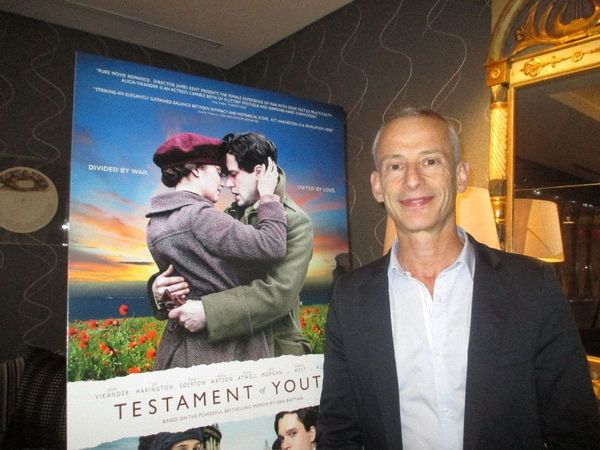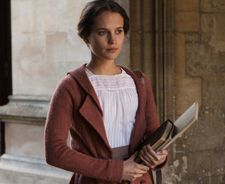 |
| Testament of Youth director James Kent on Vera Brittain: "She was hungry for literature, hungry to see particularly women writers…" Photo: Anne-Katrin Titze |
At high noon, before Interview Magazine's New York premiere of Sony Pictures Classics’ Testament Of Youth, starring Alicia Vikander and Kit Harington with Emily Watson, Dominic West, Joanna Scanlan, Taron Egerton, Miranda Richardson, Colin Morgan, Jonathan Bailey and Alexandra Roach, I met up with director James Kent for a conversation on his debut feature film at the Crosby Street Hotel.
BBC Films and Heyday Films' producers David Heyman and Rosie Alison teamed up with Michael Barker and Tom Bernard co-founders of SPC to bring Vera Brittain's classic pacifist memoir to the US.
 Alicia Vikander (Vera)_225.jpg) |
| Kit Harington (Roland) Alicia Vikander (Vera): "It is about experience. As Roland says to Vera early on when they're beginning to fall in love." |
George Elliot, Thomas Hardy, Jane Austen, intellectual ambition, the juxtaposition of genders in flux, nature and the nature of experience entered into the world of our discussion.
Testament Of Youth chronicles the devastating experiences of a group of friends during the First World War. We first see a disillusioned Vera (Vikander) as she flees from the crowds into a church. Her universe has drowned. Happy banter in a peaceful idyllic countryside between Vera's brother, Edward (Taron Egerton), his friends, Victor (Colin Morgan) and Geoffrey (Jonathan Bailey), and Vera's future fiancé, Roland (Harington), acquaints us with their hopes at Oxford, their dreams and creative ambition.
The film unfolds fluidly in flashback to show how different a place the world had been antebellum, a mere four years earlier. Kent's direction takes us and his heroine back to a time when the worst thing that could happen was to swim in a forest pond with invisible rats.
When differing traumatic war experiences separate the genders, Vera, in her own way, manages to be on both sides and not a part of any traditional order. All order of civilisation collapsed on the battlefields and in the trenches. Men on all sides die like flies. The war, mirrored in pools of gold, reminds us of the dead. And at home in England, Vera's mother (Emily Watson) considers it a disaster that their cook left and that the shops are empty.
 |
| Alicia Vikander as Vera Brittain: "She loves nature. She loves flowers. She loves swimming." |
Anne-Katrin Titze: I would like to start with the framing. You begin on Armistice Day 1918 and then go back four years. This way the film asks the question of time perception. What do four years mean then and now? How long did you work on the film?
James Kent: I worked on the film for a year. It was quite quick, really. They'd been developing the script [credited to Juliette Towhidi] for three years prior to that.
AKT: So it took four years altogether?
JK: Exactly. It's the same thing. You talk about the framing. I think one thing that happens in the film is we start very wide. You see the world, you see the landscape, you see her [Vera's] world. It's a beautiful world we live in. And then as the film progresses and the horrors begin and her losses pile up, the framing gets tighter and tighter. For example, take Oxford.
When she goes there the first time you see the beautiful buildings, you see the big dining halls, you see the green lawns. Everything you see. But when you go back the second time after the war, you're on her only, not interested anymore in architecture. We are only interested in her psychology because that is what she is interested in.
 |
| Vera and Roland: "Life is about experience, good and bad. That is just the life we are given." |
Everything I took as a decision has to do with how is Vera? Does she see the outside world? Is she able to see the beautiful landscape when she is a girl? Of course she is. She loves nature. She loves flowers. She loves swimming. By the time she gets to the war, she is dealing with her own demons and hence the framing tightens.
AKT: I thought if I had to sum up what the film is about in one word, I would say: experience. The different experiences the characters have during the war, or might think they have. The juxtaposition of the genders that collapses somewhat. The girl, Vera misjudges near the end as opposed to the experience of her mother [Emily Watson].
JK: It is about experience. As Roland says to Vera early on when they're beginning to fall in love. She says: "I want to be a writer." And he says: "Don't you need some experience first?" That's the key word. And in the end, she understands what he meant. Life is about experience, good and bad. That is just the life we are given.
We are going to have a catalogue of experience and how we deal with that is how we prove ourselves worthy as human beings. So for her, all that grief, all that loss, none of that is good news but she deals with it. She injects it and she turns it into a creative piece of work that we have today. That's a very positive thing to do with experience.
 |
| Vera Brittain at Oxford: "Jane Austen, George Elliot. They were her inspiration, her life force, her ambition." |
AKT: It is interesting how you show her decision making. The boys go to Oxford, she wants to go, too. They go to war, so does she. They show her the possibilities.
JK: Of course. She has to be a bit of a tomboy, almost, to be accepted in that world. And what a joy when she finds herself in an all female college with young women who have the same spirit and intellectual ambition. If you read Testament Of Youth and also her [Vera Brittain's] diaries, they're very instructive.
We discover, her mother gave her money to buy dresses with, every week, when she was like 17. And she'd spend it on George Elliot or Thomas Hardy. She was hungry for literature, hungry to see particularly women writers, Jane Austen, George Elliot. They were her inspiration, her life force, her ambition.
AKT: Did Vera Brittain actually write her Oxford entrance essay in German instead of Latin?
Vera competes with Roland in writing poetry and when she finds out, too late, that the entrance exam requires an essay in Latin, she thinks quickly on her feet and, having nothing to lose, writes it in German.
 |
| Alicia Vikander, James Kent and Kit Harington with Sony Pictures Classics Michael Barker and Tom Bernard on the red carpet Photo: Anne-Katrin Titze |
JK: Yes, she did. Because nobody told her it was going to be in Latin. Even her brother who had done the exam and got in. No one had bothered to tell her it was going to be in Latin.
AKT: I was wondering if that was factual because it functions as such a good link to later on.
JK: Yes. When she helps the guy who is German, she has the language of German.
More coming up with James Kent and on the red carpet with Alicia Vikander and Kit Harington joined by guests at the Bow-Tie Chelsea Cinemas premiere.
Testament Of Youth opens in the US on June 5 and had its world premiere at last year's London Film Festival.





















